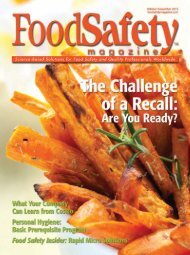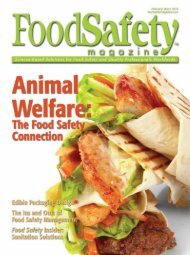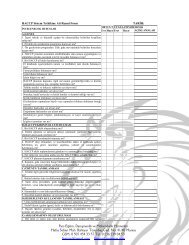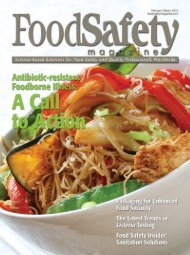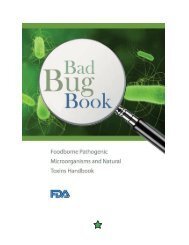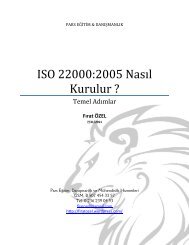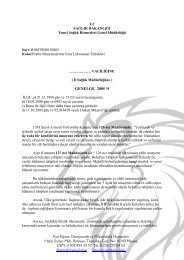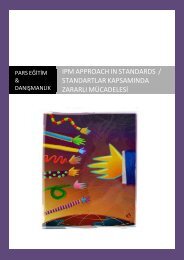- Page 1:
Food Additives Data Book
- Page 4 and 5:
© 2003 by Blackwell Science Ltd, a
- Page 6 and 7:
Contents vi Part 3 Colourings 121 A
- Page 8 and 9:
Contents viii Dextranase (Penicilli
- Page 10 and 11:
Contents x Calcium lactate pentahyd
- Page 12 and 13:
Contents xii Calcium disodium ethyl
- Page 15 and 16:
Editors Jim Smith, PhD, MBA, FIFST
- Page 17:
Part 14—Sweeteners David K. MacKi
- Page 20 and 21:
Part 1 Acidulants
- Page 22 and 23:
VAPOUR PRESSURE AT VARIOUS -17.2 (1
- Page 24 and 25:
Acceptable daily intake for humans
- Page 27 and 28:
Acidulants 8 NAME: Adipic acid CATE
- Page 29 and 30:
Acidulants 10 Diisobutyl adipate ca
- Page 31 and 32:
Acidulants 12 NAME: Caprylic acid C
- Page 33 and 34:
Acidulants 14 FOOD SAFETY ISSUES: L
- Page 35 and 36:
Acidulants 16 NAME: Citric acid CAT
- Page 37 and 38:
Acidulants 18 FUNCTION IN FOODS: Ci
- Page 39 and 40:
Acidulants 20 Monoglyceride citrate
- Page 41 and 42:
Acidulants 22 Dipotassium citrate:
- Page 43 and 44:
Acidulants 24 NAME: Dehydroacetic R
- Page 45:
Acidulants 26 Doores, S. (1990) pH
- Page 48 and 49:
WATER CONTENT MAXIMUM IN %: 0.5 HEA
- Page 50 and 51:
REFERENCES: Budavari, S., O’Neill
- Page 52 and 53:
TECHNOLOGY OF USE IN FOODS: Glucono
- Page 54 and 55:
HEAVY METAL CONTENT MAXIMUM IN 10 p
- Page 56 and 57:
It is used to flavour various poult
- Page 59 and 60:
Acidulants 40 NAME: Malic acid CATE
- Page 61 and 62:
Acidulants 42 The US Internal Reven
- Page 63 and 64:
Acidulants 44 NAME: Phosphoric acid
- Page 65 and 66:
Acidulants 46 Ammonium phosphate, d
- Page 67 and 68:
Acidulants 48 Magnesium phosphate,
- Page 69 and 70:
Acidulants 50 Sodium phosphate, dib
- Page 71 and 72:
Acidulants 52 cheese, cheese food,
- Page 73:
Acidulants 54 Doores, S. (1990) pH
- Page 76 and 77:
VAPOUR PRESSURE AT VARIOUS 4.6 (1 m
- Page 78 and 79:
propionate based on the weight of t
- Page 81 and 82:
Acidulants 62 NAME: Sodium diacetat
- Page 83:
Acidulants 64 Food Chemicals Codex
- Page 86 and 87:
ARSENIC CONTENT MAXIMUM IN ppm: 3 A
- Page 89 and 90:
Acidulants 70 NAME: Tartaric acid C
- Page 91 and 92:
Acidulants 72 Potassium bitartrate
- Page 94 and 95:
Part 2 Antioxidants
- Page 96 and 97:
SOLUBILITY % AT VARIOUS TEMPERATURE
- Page 99 and 100:
Antioxidants 80 NAME: Ascorbyl palm
- Page 101 and 102:
Antioxidants 82 NAME: Sodium ascorb
- Page 103:
Antioxidants 84 NAME: Calcium ascor
- Page 106 and 107:
in vegetable oil: @ 25°C 30% cotto
- Page 109 and 110:
Antioxidants 90 NAME: Butylated hyd
- Page 111:
Antioxidants 92 REFERENCES: Sustane
- Page 115 and 116:
Antioxidants 96 NAME: Propyl gallat
- Page 117:
Antioxidants 98 (USA: contd) Pizza
- Page 120 and 121:
FUNCTION IN FOODS: Prevents oxidati
- Page 123 and 124:
Antioxidants 104 NAME: Tocopherols,
- Page 125:
Antioxidants 106 NAME: Beta-caroten
- Page 128 and 129:
REFERENCES: Schuler, P. (1990) In:
- Page 131 and 132:
Antioxidants 112 NAME: Tocopherol,
- Page 133 and 134:
Antioxidants 114 NAME: Citric acid
- Page 135 and 136:
Antioxidants 116 NAME: Ethylenediam
- Page 137 and 138:
Antioxidants 118 NAME: L-Tartaric a
- Page 140 and 141:
Part 3 Colourings
- Page 142 and 143:
HEAVY METAL CONTENT MAXIMUM 50 IN p
- Page 145 and 146:
Colourings 126 NAME: Allura Red AC
- Page 147:
Colourings 128 FOOD SAFETY ISSUES:
- Page 150 and 151:
HEAVY METAL CONTENT MAXIMUM IN
- Page 153 and 154:
Colourings 134 NAME: Amaranth CATEG
- Page 155:
Colourings 136 LEGISLATION: USA: CA
- Page 158 and 159:
PURITY %: Bixin powders 25%; norbix
- Page 160 and 161:
STRUCTURE OF ANNATTO: CH 3 CH3 RO C
- Page 162 and 163:
BOILING POINT IN °C AT VARIOUS N/A
- Page 164 and 165:
REFERENCES: Jackman, R. L., Yada, R
- Page 166 and 167:
HEAVY METAL CONTENT MAXIMUM IN
- Page 169 and 170:
Colourings 150 NAME: Brilliant Blue
- Page 171:
Colourings 152 LEGISLATION: USA: CA
- Page 174 and 175:
VAPOUR PRESSURE AT VARIOUS N/A TEMP
- Page 177 and 178:
Colourings 158 NAME: Brown HT CATEG
- Page 179:
Colourings 160 LEGISLATION: USA: CA
- Page 182 and 183:
HEAVY METAL CONTENT MAXIMUM IN 40 p
- Page 184 and 185:
WATER CONTENT MAXIMUM IN %: 5 HEAVY
- Page 187 and 188:
Colourings 168 NAME: Plain caramel
- Page 189:
Colourings 170 LEGISLATION: USA: CA
- Page 192 and 193:
WATER CONTENT MAXIMUM IN %: Typical
- Page 195 and 196:
Colourings 176 NAME: Caustic sulphi
- Page 197:
Colourings 178 FOOD SAFETY ISSUES:
- Page 200 and 201:
WATER CONTENT MAXIMUM IN %: Typical
- Page 203 and 204:
Colourings 184 NAME: Beetroot red C
- Page 205:
Colourings 186 LEGISLATION: USA: CA
- Page 208 and 209:
WATER CONTENT MAXIMUM IN %: 21.0% H
- Page 211 and 212:
Colourings 192 NAME: Carminic acid
- Page 213:
Colourings 194 LEGISLATION: USA: CA
- Page 216 and 217:
PURITY %: Not less than 85% dye con
- Page 219 and 220:
Colourings 200 NAME: Beta-carotene
- Page 221:
Colourings 202 LEGISLATION: USA: UK
- Page 224 and 225:
WATER CONTENT MAXIMUM IN %: 2 HEAVY
- Page 227 and 228:
Colourings 208 NAME: Chlorophyll CA
- Page 229 and 230:
Colourings 210 ANTAGONISTS: Sulphur
- Page 231 and 232:
Colourings 212 NAME: Chlorophyllin
- Page 233:
Colourings 214 LEGISLATION: USA: UK
- Page 236 and 237:
HEAVY METAL CONTENT MAXIMUM IN 40 p
- Page 239 and 240:
Colourings 220 NAME: Copper chlorop
- Page 241:
Colourings 222 LEGISLATION: USA: UK
- Page 244 and 245:
WATER CONTENT MAXIMUM IN %: N/A HEA
- Page 247 and 248:
Colourings 228 NAME: Curcumin CATEG
- Page 249:
Colourings 230 ANTAGONISTS: Strong
- Page 252 and 253:
WATER CONTENT MAXIMUM IN %: 15 HEAV
- Page 255 and 256:
Colourings 236 NAME: Ethyl ester of
- Page 257:
Colourings 238 When used to colour
- Page 260 and 261:
PURITY %: 85% miniumum WATER CONTEN
- Page 263 and 264:
Colourings 244 NAME: Gold CATEGORY:
- Page 265:
Colourings 246 LEGISLATION: USA: CA
- Page 268 and 269:
PURITY %: Not less than 80% total c
- Page 271 and 272:
Colourings 252 NAME: Indigotine CAT
- Page 273:
Colourings 254 LEGISLATION: USA: UK
- Page 276 and 277:
ANTAGONISTS: None known FOOD SAFETY
- Page 278 and 279:
HEAVY METAL CONTENT MAXIMUM IN 40 p
- Page 281 and 282:
Colourings 262 NAME: Yellow iron ox
- Page 283:
Colourings 264 LEGISLATION: USA: UK
- Page 286 and 287:
HEAVY METAL CONTENT MAXIMUM IN 40 p
- Page 289 and 290:
Colourings 270 NAME: Monascus CATEG
- Page 291 and 292:
Colourings 272 FOOD SAFETY ISSUES:
- Page 293 and 294:
Colourings 274 NAME: Brilliant Blac
- Page 295:
Colourings 276 LEGISLATION: USA: UK
- Page 298 and 299:
PURITY %: Content not less than 85%
- Page 301 and 302:
Colourings 282 NAME: Ponceau 4R CAT
- Page 303:
Colourings 284 LEGISLATION: USA: UK
- Page 306 and 307:
WATER CONTENT MAXIMUM IN %: 30 HEAV
- Page 309 and 310:
Colourings 290 NAME: Ponceau SX CAT
- Page 311:
Colourings 292 REFERENCE: Walford,
- Page 314 and 315:
ARSENIC CONTENT MAXIMUM IN ppm: 3 A
- Page 316 and 317:
PURITY %: 85% total colouring matte
- Page 319 and 320:
Colourings 300 NAME: Tartrazine CAT
- Page 321 and 322:
Colourings 302 FOOD SAFETY ISSUES:
- Page 323 and 324:
Colourings 304 NAME: Titanium dioxi
- Page 325:
Colourings 306 LEGISLATION: USA: UK
- Page 328 and 329:
HEAVY METAL CONTENT MAXIMUM IN 40 p
- Page 331 and 332:
Colourings 312 NAME: Vegetable carb
- Page 333:
Colourings 314 LEGISLATION: USA: CA
- Page 336 and 337:
HEAVY METAL CONTENT MAXIMUM IN
- Page 339 and 340:
Colourings 320 NAME: Santalin CATEG
- Page 341:
Colourings 322 LEGISLATION: USA: CA
- Page 344 and 345:
HEAVY METAL CONTENT MAXIMUM IN 40 p
- Page 347 and 348:
Colourings 328 NAME: Lycopene CATEG
- Page 349:
Colourings 330 LEGISLATION: USA: UK
- Page 352 and 353:
WATER CONTENT MAXIMUM IN %: 2 HEAVY
- Page 354 and 355:
OH CH 3 Capsorubin CH3 CH3 CH 3 CH3
- Page 356 and 357:
HEAVY METAL CONTENT MAXIMUM IN 40 p
- Page 359 and 360:
Colourings 340 NAME: Riboflavin-5¢
- Page 361 and 362:
Colourings 342 LEGISLATION: USA: UK
- Page 363 and 364:
Emulsifiers 344 NAME: Mono- and dig
- Page 365:
Emulsifiers 346 LEGISLATION: USA: U
- Page 368 and 369:
FUNCTION IN FOODS: Emulsion-stabili
- Page 370 and 371:
ALTERNATIVES: Lactic acid esters/ p
- Page 372 and 373:
TECHNOLOGY OF USE IN FOODS: Crystal
- Page 374 and 375:
FUNCTION IN FOODS: Used in bread an
- Page 376 and 377:
TECHNOLOGY OF USE IN FOODS: Can mod
- Page 379 and 380:
Emulsifiers 360 NAME: Succinic acid
- Page 381:
Emulsifiers 362 NAME: Tartaric acid
- Page 385 and 386:
Emulsifiers 366 NAME: Lecithins CAT
- Page 387 and 388:
Emulsifiers 368 NAME: Polyglycerol
- Page 389 and 390:
Emulsifiers 370 NAME: Polyglycerol
- Page 391 and 392:
Emulsifiers 372 NAME: Propylene gly
- Page 393 and 394:
Emulsifiers 374 NAME: Sodium stearo
- Page 395 and 396:
Emulsifiers 376 NAME: Calcium stear
- Page 397 and 398:
Emulsifiers 378 NAME: Sorbitan este
- Page 399 and 400:
Emulsifiers 380 NAME: Polysorbates
- Page 401 and 402:
Emulsifiers 382 NAME: Sucrose ester
- Page 403 and 404:
Emulsifiers 384 NAME: Ammonium phos
- Page 405:
Emulsifiers 386 NAME: Di-octyl sodi
- Page 408 and 409:
Part 5 Enzymes
- Page 410 and 411:
ANTAGONISTS: Cereals - inhibited by
- Page 413 and 414:
Enzymes 394 activity NAME: Amyloglu
- Page 415:
Enzymes 396 NAME: Anthocyanase CATE
- Page 418 and 419:
LEGISLATION: USA: CANADA: GRAS stat
- Page 420 and 421:
LEGISLATION: USA: UK and EUROPE: GR
- Page 423 and 424:
Enzymes 404 NAME: Beta-glucosidase
- Page 425:
Enzymes 406 NAME: Bromelain CATEGOR
- Page 429:
Enzymes 410 NAME: Cellobiase (Asper
- Page 432 and 433:
LEGISLATION: USA: UK and EUROPE: GR
- Page 435:
Enzymes 416 NAME: Dextranase (Penic
- Page 439 and 440:
Enzymes 420 NAME: Ficin (Ficus spp.
- Page 441 and 442:
Enzymes 422 NAME: Glucoamylase CATE
- Page 443 and 444:
Enzymes 424 NAME: Glucose isomerase
- Page 445 and 446:
Enzymes 426 NAME: Glucose oxidase C
- Page 447:
Enzymes 428 NAME: Hemicellulase (As
- Page 451:
Enzymes 432 NAME: Invertase CATEGOR
- Page 454 and 455:
LEGISLATION: USA: UK and EUROPE: GR
- Page 457:
Enzymes 438 NAME: Microbial rennet
- Page 461 and 462:
Enzymes 442 NAME: Papain (papaya sp
- Page 463 and 464:
Enzymes 444 NAME: Pectinase CATEGOR
- Page 465:
Enzymes 446 NAME: Penicillin amidas
- Page 468 and 469:
REFERENCES: Ash, M., and Ash, I. (1
- Page 471:
Enzymes 452 NAME: Pullulanase CATEG
- Page 474 and 475:
REFERENCES: Ash, M., and Ash, I. (1
- Page 477:
Enzymes 458 NAME: Tannase CATEGORY:
- Page 481 and 482:
Enzymes 462 NAME: Xylanase CATEGORY
- Page 483 and 484:
Flavour Enhancers 464 NAME: Acetic
- Page 485:
Flavour Enhancers 466 (USA: contd)
- Page 489:
Flavour Enhancers 470 NAME: Red alg
- Page 492 and 493:
Pre-solubilised: shelf-stable solut
- Page 495:
Flavour Enhancers 476 NAME: Esteras
- Page 498 and 499:
LEGISLATION: USA: UK and EUROPE: FD
- Page 500 and 501:
solvent; texture modifier; vehicle
- Page 503:
Flavour Enhancers 484 NAME: Licoric
- Page 506 and 507:
LEGISLATION: USA: UK and EUROPE: FD
- Page 508 and 509:
FUNCTION IN FOODS: Flavour adjuvant
- Page 510 and 511:
ANY OTHER RELEVANT INFORMATION: Man
- Page 513 and 514:
Flavour Enhancers 494 NAME: Potassi
- Page 515 and 516:
Flavour Enhancers 496 NAME: Monosod
- Page 517:
Flavour Enhancers 498 REFERENCE: Le
- Page 520 and 521:
ALTERNATIVES: Ammonium chloride/ Ca
- Page 523 and 524:
Flavour Enhancers 504 NAME: Sodium
- Page 525:
Flavour Enhancers 506 REFERENCE: Le
- Page 528 and 529:
FOOD SAFETY ISSUES: Moderately toxi
- Page 530 and 531:
FOOD SAFETY ISSUES: Poison by inges
- Page 532 and 533:
TECHNOLOGY OF USE IN FOODS: 1 gram
- Page 534 and 535:
LEGISLATION: USA: UK and EUROPE: FD
- Page 536 and 537:
LEGISLATION: USA: CANADA: FDA 21CFR
- Page 538 and 539:
LEGISLATION: USA: UK and EUROPE: FD
- Page 541:
Flavour Enhancers 522 NAME: Licoric
- Page 545 and 546:
Flavour Enhancers 526 NAME: Sucralo
- Page 547 and 548:
Flavour Enhancers 528 NAME: Thaumat
- Page 549:
Flavour Enhancers 530 NAME: Potassi
- Page 552:
LEGISLATION: USA: UK and EUROPE: FD
- Page 555 and 556:
Flour Additives 536 NAME: Alpha-amy
- Page 557 and 558:
Flour Additives 538 NAME: Chlorine
- Page 559 and 560:
Flour Additives 540 NAME: Chlorine
- Page 561 and 562:
Flour Additives 542 NAME: Glucono-d
- Page 563 and 564:
Flour Additives 544 NAME: Disodium
- Page 565 and 566:
Flour Additives 546 NAME: Monopotas
- Page 567 and 568:
Flour Additives 548 NAME: Hemicellu
- Page 569 and 570:
Flour Additives 550 NAME: Calcium t
- Page 571 and 572:
Flour Additives 552 NAME: L-Cystein
- Page 573 and 574:
Flour Additives 554 NAME: Sodium hy
- Page 575 and 576:
Flour Additives 556 NAME: Sodium al
- Page 578 and 579:
Part 8 Gases
- Page 581:
Gases 562 NAME: Hydrogen CATEGORY:
- Page 584 and 585:
LEGISLATION: USA: FDA 21CFR § 184.
- Page 586 and 587:
TECHNOLOGY OF USE IN FOODS: Produce
- Page 588 and 589:
and some magnesium-aluminium alloy
- Page 590:
FOOD SAFETY ISSUES: Low toxicity. I
- Page 593 and 594:
Nutritive Additives 574 NAME: DL-a-
- Page 595 and 596:
Nutritive Additives 576 NAME: DL-a-
- Page 597:
Nutritive Additives 578 NAME: Pyrid
- Page 600 and 601:
LEGISLATION: USA: CANADA: Regulatio
- Page 602 and 603:
LEGISLATION: USA: CANADA: AUSTRALIA
- Page 604 and 605:
LEGISLATION: USA: CANADA: Regulatio
- Page 606 and 607:
REFERENCES: Ash, M., and Ash, I. (1
- Page 608 and 609:
REFERENCES: Ash, M., and Ash, I. (1
- Page 610 and 611:
REFERENCES: Ash, M., and Ash, I. (1
- Page 612 and 613:
REFERENCES: Ash, M., and Ash, I. (1
- Page 614 and 615:
ANY OTHER RELEVANT INFORMATION: In
- Page 616 and 617:
TECHNOLOGY OF USE IN FOODS: Oily su
- Page 619:
Nutritive Additives 600 NAME: Panto
- Page 622 and 623:
LEGISLATION: USA: CANADA: FDA 21CFR
- Page 625 and 626:
Nutritive Additives 606 NAME: L-Asc
- Page 627:
Nutritive Additives 608 LEGISLATION
- Page 630 and 631:
FOOD SAFETY ISSUES: Some adverse ef
- Page 632 and 633:
LEGISLATION: USA: CANADA: GRAS for
- Page 634 and 635:
LEGISLATION: USA: CANADA: GRAS for
- Page 636 and 637:
LEGISLATION: USA: CANADA: GRAS for
- Page 638 and 639:
LEGISLATION: USA: CANADA: GRAS. For
- Page 640 and 641:
ANTAGONISTS: Acids FOOD SAFETY ISSU
- Page 642 and 643:
TECHNOLOGY OF USE IN FOODS: Affects
- Page 644 and 645:
ALTERNATIVES: Calcium carbonate, ca
- Page 646 and 647:
ANTAGONISTS: Air, humidity, oxygen
- Page 648 and 649:
LEGISLATION: USA: CANADA: GRAS for
- Page 650 and 651:
ANTAGONISTS: Light; reducing agents
- Page 652 and 653:
LEGISLATION: USA: CANADA: GRAS in s
- Page 654 and 655:
FOOD SAFETY ISSUES: Toxicology: LD
- Page 656 and 657:
LEGISLATION: USA: CANADA: GRAS for
- Page 658 and 659:
TECHNOLOGY OF USE IN FOODS: Affects
- Page 660 and 661:
LEGISLATION: USA: UK and EUROPE: Fo
- Page 662 and 663:
LEGISLATION: USA: CANADA: GRAS for
- Page 664 and 665:
TECHNOLOGY OF USE IN FOODS: Soluble
- Page 666 and 667:
LEGISLATION: USA: CANADA: GRAS for
- Page 668 and 669:
FOOD SAFETY ISSUES: Poison by intra
- Page 670 and 671:
less than 2 years old, Recommended
- Page 672 and 673:
FOOD SAFETY ISSUES: Toxicology: LD
- Page 674 and 675:
REFERENCES: Ash, M., and Ash, I. (1
- Page 676:
LEGISLATION: USA: CANADA: GRAS for
- Page 679 and 680:
Polysaccharides 660 NAME: Agar CATE
- Page 681 and 682:
Polysaccharides 662 NAME: Algin CAT
- Page 683 and 684:
Polysaccharides 664 NAME: Alginic a
- Page 685 and 686:
Polysaccharides 666 NAME: Ammonium
- Page 687 and 688:
Polysaccharides 668 NAME: Gum arabi
- Page 689 and 690:
Polysaccharides 670 NAME: Calcium a
- Page 691 and 692:
Polysaccharides 672 NAME: Iota-carr
- Page 693:
Polysaccharides 674 Therkelsen, G.
- Page 696 and 697:
ALTERNATIVES: Gelatin; gellan; agar
- Page 699 and 700:
Polysaccharides 680 NAME: Lambda-ca
- Page 701:
Polysaccharides 682 ANY OTHER RELEV
- Page 704 and 705:
particularly potassium and calcium
- Page 707 and 708:
Polysaccharides 688 NAME: Cellulose
- Page 709 and 710:
Polysaccharides 690 NAME: Chitosan
- Page 711 and 712:
Polysaccharides 692 NAME: Carboxyme
- Page 713 and 714:
Polysaccharides 694 NAME: Dextran C
- Page 715 and 716:
Polysaccharides 696 NAME: Furcellar
- Page 717 and 718:
Polysaccharides 698 NAME: Gellan CA
- Page 719 and 720:
Polysaccharides 700 NAME: Gum ghatt
- Page 721 and 722:
Polysaccharides 702 NAME: Guar gum
- Page 723 and 724:
Polysaccharides 704 NAME: Hydroxy e
- Page 725 and 726:
Polysaccharides 706 NAME: Hydroxy p
- Page 727 and 728:
Polysaccharides 708 NAME: Hydroxy p
- Page 729 and 730:
Polysaccharides 710 NAME: Karaya gu
- Page 731 and 732:
Polysaccharides 712 NAME: Locust be
- Page 733 and 734:
Polysaccharides 714 NAME: Methyl ce
- Page 735 and 736:
Polysaccharides 716 NAME: Methyl et
- Page 737 and 738:
Polysaccharides 718 NAME: Microcrys
- Page 739 and 740:
Polysaccharides 720 NAME: Pectin CA
- Page 741 and 742:
Polysaccharides 722 NAME: Propylene
- Page 743 and 744:
Polysaccharides 724 NAME: Potassium
- Page 745 and 746:
Polysaccharides 726 NAME: Tragacant
- Page 747 and 748:
Polysaccharides 728 NAME: Xanthan C
- Page 750 and 751:
Part 11 Preservatives
- Page 752 and 753:
PURITY %: >99 (anhydrous basis) WAT
- Page 755 and 756:
Preservatives 736 NAME: Sodium sorb
- Page 757:
Preservatives 738 LEGISLATION: USA:
- Page 760 and 761:
PURITY %: >98 (anhydrous basis) WAT
- Page 763 and 764:
Preservatives 744 NAME: Calcium sor
- Page 765:
Preservatives 746 LEGISLATION: USA:
- Page 768 and 769:
PURITY %: >99.5 (anhydrous basis) W
- Page 771 and 772:
Preservatives 752 NAME: Sodium benz
- Page 773:
Preservatives 754 ANY OTHER RELEVAN
- Page 776 and 777:
TECHNOLOGY OF USE IN FOODS: Effecti
- Page 778 and 779:
LEGISLATION: USA: UK and EUROPE: FD
- Page 780 and 781:
TECHNOLOGY OF USE IN FOODS: pH opti
- Page 783 and 784:
Preservatives 764 NAME: Propyl-4-hy
- Page 785:
Preservatives 766 NAME: Propyl-4-hy
- Page 788 and 789:
SOLUBILITY % AT VARIOUS TEMPERATURE
- Page 791 and 792:
Preservatives 772 NAME: Sulphur dio
- Page 793 and 794:
Preservatives 774 NAME: Sodium sulp
- Page 795 and 796:
Preservatives 776 NAME: Sodium bisu
- Page 797 and 798:
Preservatives 778 NAME: Sodium meta
- Page 799 and 800:
Preservatives 780 NAME: Potassium m
- Page 801 and 802:
Preservatives 782 NAME: Calcium sul
- Page 803 and 804:
Preservatives 784 NAME: Calcium bis
- Page 805 and 806:
Preservatives 786 NAME: Biphenyl CA
- Page 807 and 808:
Preservatives 788 NAME: 2-Hydroxybi
- Page 809:
Preservatives 790 NAME: Sodium o-ph
- Page 813 and 814:
Preservatives 794 NAME: Nisin CATEG
- Page 815:
Preservatives 796 NAME: Hexamethyle
- Page 818 and 819:
TECHNOLOGY OF USE IN FOODS: 2lb/100
- Page 820 and 821:
ALTERNATIVES: Multifunctional, so r
- Page 822 and 823:
LEGISLATION: USA: UK and EUROPE: CA
- Page 824 and 825:
TECHNOLOGY OF USE IN FOODS: 200ppm
- Page 826 and 827:
TECHNOLOGY OF USE IN FOODS: 1% (foo
- Page 828 and 829:
LEGISLATION: USA: CANADA: FDA 21CFR
- Page 830 and 831:
LEGISLATION: USA: UK and EUROPE: FD
- Page 833 and 834:
Preservatives 814 NAME: Heptyl para
- Page 836 and 837:
Part 12 Sequestrants
- Page 838 and 839:
SOLUBILITY % AT VARIOUS TEMPERATURE
- Page 840 and 841:
SOLUBILITY % AT VARIOUS TEMPERATURE
- Page 842 and 843:
FOOD SAFETY ISSUES: Citrates may in
- Page 844 and 845:
FOOD SAFETY ISSUES: May cause gastr
- Page 846 and 847:
ARSENIC CONTENT MAXIMUM IN ppm: 3 F
- Page 848 and 849:
ALTERNATIVES: Citrates; pyrophospha
- Page 850 and 851:
WATER CONTENT MAXIMUM IN %: 0.5 HEA
- Page 853 and 854:
Sequestrants 834 NAME: Disodium eth
- Page 855 and 856:
Sequestrants 836 NAME: Disodium pyr
- Page 857 and 858:
Sequestrants 838 NAME: Glucono-delt
- Page 859:
Sequestrants 840 NAME: Isopropyl ci
- Page 862 and 863:
ALTERNATIVES: Sodium phosphates TEC
- Page 864 and 865:
FUNCTION IN FOODS: Preserves colour
- Page 866 and 867:
FUNCTION IN FOODS: Sequestrant, pH
- Page 869 and 870:
Sequestrants 850 NAME: Sodium monoh
- Page 871 and 872:
Sequestrants 852 NAME: Sodium polyp
- Page 873 and 874:
Sequestrants 854 NAME: Sodium tartr
- Page 875:
Sequestrants 856 NAME: Oxystearin C
- Page 878 and 879:
HEAVY METAL CONTENT MAXIMUM IN 10 p
- Page 880 and 881:
Part 13 Solvents
- Page 882 and 883:
SOLUBILITY % AT VARIOUS TEMPERATURE
- Page 885 and 886: Solvents 866 NAME: Acetylated monog
- Page 887 and 888: Solvents 868 NAME: Amyl acetate CAT
- Page 889 and 890: Solvents 870 NAME: Benzyl alcohol C
- Page 891 and 892: Solvents 872 NAME: 1,3-Butanediol C
- Page 893 and 894: Solvents 874 NAME: Castor oil CATEG
- Page 895 and 896: Solvents 876 NAME: Diethyl tartrate
- Page 897 and 898: Solvents 878 NAME: Ethanol CATEGORY
- Page 899 and 900: Solvents 880 NAME: Ethyl acetate CA
- Page 901 and 902: Solvents 882 NAME: Glycerin CATEGOR
- Page 903: Solvents 884 (UK and EUROPE: contd)
- Page 906 and 907: SOLUBILITY % AT VARIOUS TEMPERATURE
- Page 908 and 909: SOLUBILITY % AT VARIOUS TEMPERATURE
- Page 910 and 911: SOLUBILITY % AT VARIOUS TEMPERATURE
- Page 912 and 913: TECHNOLOGY OF USE IN FOODS: Soluble
- Page 914 and 915: TECHNOLOGY OF USE IN FOODS: Used as
- Page 916 and 917: SOLUBILITY % AT VARIOUS TEMPERATURE
- Page 918: SOLUBILITY % AT VARIOUS TEMPERATURE
- Page 921 and 922: Sweeteners 902 NAME: Acesulphame CA
- Page 923 and 924: Sweeteners 904 Disintegrant (e.g. l
- Page 925 and 926: Sweeteners 906 FOOD SAFETY ISSUES:
- Page 927 and 928: Sweeteners 908 - USSR Not permitted
- Page 929: Sweeteners 910 NAME: N-acetylglucos
- Page 933 and 934: Sweeteners 914 NAME: Aspartame CATE
- Page 935: Sweeteners 916 When used in soft dr
- Page 939 and 940: Sweeteners 920 (f ) If the food con
- Page 941 and 942: Sweeteners 922 Item A.A3, Table III
- Page 943 and 944: Sweeteners 924 NAME: Cyclamate CATE
- Page 945 and 946: Sweeteners 926 No browning reaction
- Page 947 and 948: Sweeteners 928 -West Germany 800 mg
- Page 949: Sweeteners 930 Budavari, S. (1996)
- Page 952 and 953: TECHNOLOGY OF USE IN FOODS: Does no
- Page 954 and 955: Herbs and seasonings, §170.3(n)(26
- Page 957 and 958: Sweeteners 938 NAME: Isomalt CATEGO
- Page 959 and 960: Sweeteners 940 NAME: Lactitol CATEG
- Page 961: Sweeteners 942 FOOD SAFETY ISSUES:
- Page 964 and 965: FUNCTION IN FOODS: Bulking agent, s
- Page 966 and 967: - In case material is released or s
- Page 969 and 970: Sweeteners 950 NAME: Mannitol CATEG
- Page 971 and 972: Sweeteners 952 Solubility: 1 g/5.5
- Page 973: Sweeteners 954 REFERENCES: Smith, J
- Page 977 and 978: Sweeteners 958 NAME: Saccharin CATE
- Page 979 and 980: Sweeteners 960 3:1 cyclamate :sacch
- Page 981 and 982: Sweeteners 962 101.11 Saccharin and
- Page 983 and 984: Sweeteners 964 - East Germany 20 to
- Page 985: Sweeteners 966 Canadian Food and Dr
- Page 988 and 989:
MELTING RANGE IN °C: Crystalline:
- Page 990 and 991:
Stability: stable to heat, chemical
- Page 992 and 993:
- Granulation/concentration: 70% co
- Page 994 and 995:
Humectant and stabiliser - good hum
- Page 996 and 997:
LEGISLATION: USA: GRAS by US FASEB
- Page 998 and 999:
CANADA: Canada FDR 67-29 -available
- Page 1000 and 1001:
Hexahydric sugar alcohol; isomeric
- Page 1002 and 1003:
TECHNOLOGY OF USE IN FOODS: Steviol
- Page 1004 and 1005:
OTHER COUNTRIES: Permitted for use
- Page 1007 and 1008:
Sweeteners 988 NAME: Sucralose CATE
- Page 1009 and 1010:
Sweeteners 990 (4) Desserts; desser
- Page 1011 and 1012:
Sweeteners 992 NAME: Thaumatin CATE
- Page 1013 and 1014:
Sweeteners 994 Interaction with tas
- Page 1015 and 1016:
Sweeteners 996 (c) may have added t
- Page 1017:
Sweeteners 998 100,000 times as swe
- Page 1020 and 1021:
TECHNOLOGY OF USE IN FOODS: An affi
- Page 1022:
REFERENCES: Smith, J. (1991) Food A
- Page 1025 and 1026:
Index 1006 ammonium potassium phosp
- Page 1027 and 1028:
Index 1008 CAS 9012-54-8, 402 CAS 9
- Page 1029 and 1030:
Index 1010 edible oils and fats, ED
- Page 1031 and 1032:
Index 1012 hydrogen peroxide oxidor
- Page 1033 and 1034:
Index 1014 688, 690, 692, 694, 696,
- Page 1035:
Index 1016 vitamin C, 606, 610, 614





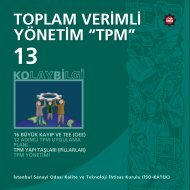
![Otomatik indirilmez ise tıklayınız [Download]](https://img.yumpu.com/44170525/1/190x190/otomatik-indirilmez-ise-taklayanaz-download.jpg?quality=85)
